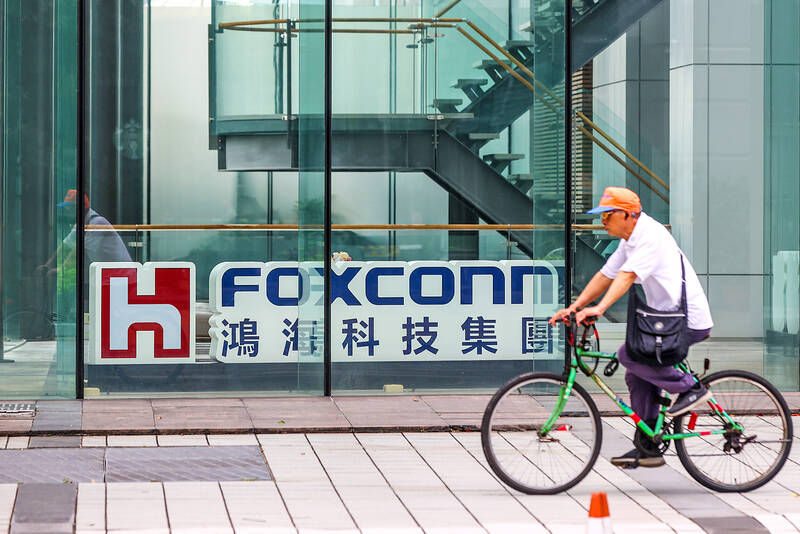Vietnamese officials have called on Apple Inc supplier Foxconn Technology Group (富士康科技集團) to voluntarily reduce power use by 30 percent at its assembly plants in the north of the nation where there were electricity outages last year, two people familiar with the matter said.
The request for energy-saving measures, which two other industry sources said was sent to multiple manufacturers, is precautionary and aimed at averting a repeat of last summer, when power shortages led to more than US$1 billion in lost output.
The request to Foxconn — known as Hon Hai Precision Industry Co (鴻海精密) in Taiwan — was “an encouragement,” not a requirement and has not had any impact on production, one of the people said.

Photo: Ritchie B. Tongo, EPA-EFE
Vietnam is increasingly welcoming multinational companies, some spreading their risk from traditional manufacturing base China amid rising trade tensions with the US.
The Southeast Asian nation relies on foreign investment for economic growth and has been trying to attract energy-intensive industries, such as semiconductor manufacturing.
However, a heat wave in May and June last year triggered power shortages that interrupted business in the north, causing US$1.4 billion in losses, or 0.3 percent of GDP, World Bank preliminary estimates showed.
Vietnamese Prime Minister Pham Minh Chinh in March pledged to foreign investors that power shortages would not happen again.
The government has asked coal-fired power plants to delay maintenance to meet higher electricity demand in the hottest months, one of the people said.
Foxconn is the world’s largest contract electronics manufacturer. It has half a dozen plants in northern Vietnam, including in Bac Giang Province where local authorities said it assembles Apple Inc’s MacBooks and iPads.
State-owned provincial power distributor Bac Giang Power Co in March said that it had asked industrial parks and authorities “to coordinate in implementing electricity savings,” according to a statement posted on the Web site of the Electricity Regulatory Authority of Vietnam.
Vietnam’s weather conditions are less challenging this year than last year, but authorities have boosted imports of coal and encouraged energy-saving to avoid shortages.
Energy-saving measures appear to differ nationwide. An official at an industrial park in another northern province said manufacturers have been asked to reduce power consumption on some days this month.

The Eurovision Song Contest has seen a surge in punter interest at the bookmakers, becoming a major betting event, experts said ahead of last night’s giant glamfest in Basel. “Eurovision has quietly become one of the biggest betting events of the year,” said Tomi Huttunen, senior manager of the Online Computer Finland (OCS) betting and casino platform. Betting sites have long been used to gauge which way voters might be leaning ahead of the world’s biggest televised live music event. However, bookmakers highlight a huge increase in engagement in recent years — and this year in particular. “We’ve already passed 2023’s total activity and

Nvidia Corp CEO Jensen Huang (黃仁勳) today announced that his company has selected "Beitou Shilin" in Taipei for its new Taiwan office, called Nvidia Constellation, putting an end to months of speculation. Industry sources have said that the tech giant has been eyeing the Beitou Shilin Science Park as the site of its new overseas headquarters, and speculated that the new headquarters would be built on two plots of land designated as "T17" and "T18," which span 3.89 hectares in the park. "I think it's time for us to reveal one of the largest products we've ever built," Huang said near the

BIG BUCKS: Chairman Wei is expected to receive NT$34.12 million on a proposed NT$5 cash dividend plan, while the National Development Fund would get NT$8.27 billion Taiwan Semiconductor Manufacturing Co (TSMC, 台積電), the world’s largest contract chipmaker, yesterday announced that its board of directors approved US$15.25 billion in capital appropriations for long-term expansion to meet growing demand. The funds are to be used for installing advanced technology and packaging capacity, expanding mature and specialty technology, and constructing fabs with facility systems, TSMC said in a statement. The board also approved a proposal to distribute a NT$5 cash dividend per share, based on first-quarter earnings per share of NT$13.94, it said. That surpasses the NT$4.50 dividend for the fourth quarter of last year. TSMC has said that while it is eager

China yesterday announced anti-dumping duties as high as 74.9 percent on imports of polyoxymethylene (POM) copolymers, a type of engineering plastic, from Taiwan, the US, the EU and Japan. The Chinese Ministry of Commerce’s findings conclude a probe launched in May last year, shortly after the US sharply increased tariffs on Chinese electric vehicles, computer chips and other imports. POM copolymers can partially replace metals such as copper and zinc, and have various applications, including in auto parts, electronics and medical equipment, the Chinese ministry has said. In January, it said initial investigations had determined that dumping was taking place, and implemented preliminary